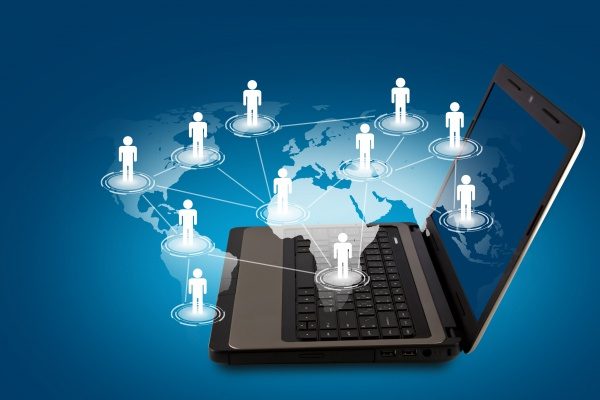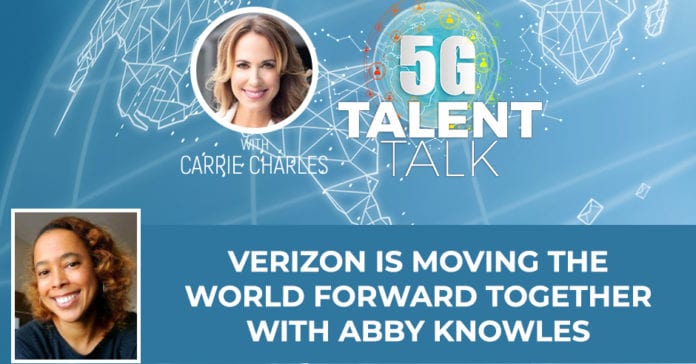What does diversity and inclusion have to do with the world of 5G technology? For Verizon Global Network and Technology Vice President Abby Knowles, equity, diversity and inclusion are going to allow companies to make better and stronger technological innovations. This point of view very much mirrors the telecommunication giant’s stance towards social justice, which serves as a model for the rest of the industry to follow. In the spirit of Women’s Month, Abby joins Carrie Charles to explain why Verizon is not only leading the world in wireless technology, but also in promoting social justice within its ranks and beyond. A Verizon success story herself, Abby is a living proof of the company’s long-standing commitment towards leveraging the unique talents and capabilities that individuals from various backgrounds can offer. She is now at the forefront of that renewed and amplified commitment as Verizon strives to create new benchmarks for diversity and inclusion in the wireless space.
—
Watch the episode here
Listen to the podcast here
Verizon is Moving the World Forward Together with Abby Knowles
It is one of my most favorite months of the year. It is Women’s History Month. We are celebrating that with a very special guest and one of my favorite people in the whole world, Abby Knowles. She is the Vice President of the Global Network and Technology Organization of Verizon. We are both wearing Verizon colors which was not planned. We are very much in support of Verizon. Abby, thanks so much for being on the show.
Thank you so much for having me, Carrie. It’s an honor.
You are truly one of my favorite leaders to follow. I have heard you speak and you’re inspiring. I’ve learned so much from you. I want to tell our audience about your journey. How did you get to where you are? What obstacles did you face and how did you overcome them?
It’s quite a heavy load to be someone that’s followed because you have to lead the right way. I do pray about that. I do ask for wisdom and guidance. I lead almost 1,000 engineers in the Western half of the United States for Verizon. We helped to build and operate the Verizon network that our mobile customers and our 5G customers use. I take that as a serious responsibility in my leadership there. I started with Verizon many years ago. I came to the United States a little more than that. I came here and studied Electrical Engineering at Morgan State University, a historically black college and university.
That helped prepare me for the corporate world. I was surrounded by people that looked and sounded like me. I came from Jamaica, a country where everybody looked and sounded like me. I came in with confidence. I did a LinkedIn post on this in 2020 for Women’s History Month. I was surrounded by this cadre of women who mentoring was not their thing. They didn’t say,
“I’m going to sign up to mentor, but that’s what they did.” To me, a new electrical engineer in Bell Atlantic at that time in Baltimore, I thought it was normal. I had all these women, some were black, some were white, and they poured into me, gave me advice on my career, owning my career, speaking up, asking for projects.
I was also fortunate to be selected for a mentoring program for new hires at that time. I was paired up with a retired Bell Atlantic vice president. He taught me about skip-level meetings and asking for an opportunity to work on projects. That’s where I got my first start because I took his advice, went to my director, and said, “Can I have a skip-level meeting? Can I work on a project?” The project that I did wasn’t technical per se, but it was a newsletter that grew in terms of readership and it was uniting the entire organization that was newly formed. A quick summary there in terms of how I started and a little bit of the confidence that I had both from my education, mentoring program, and the people that I was surrounded by when I joined.
Your story is amazing. You talked about mentorship and not only mentorship, which is important for everyone, men and women, but also that you took the advice, the risk, you stepped out, and asked for more. Those two together, the mentorship and the action. Thank you for sharing that.
Verizon continues to drive for technology leadership with 5G. Can you tell us about the Verizon culture, leadership, and also the CEO’s commitment to social justice and equity?
That’s one of the reasons why I came here to this show because people might think, “How do those two go together?” Technology leadership and social justice. They do and they have to because it’s part of our social responsibility as business leaders to make sure that we’re doing our part internally in the company, but also to society. From a technology leadership, Verizon intends to be ranked as a top tech company. Fortune has ranked us as the number one telecom company. Earlier in 2020, in the middle of the pandemic, Forbes Magazine also ranked us as the top company in terms of responding. We are proud of our leadership. We’ve been bullish about technology. That’s our culture and our legacy.
When we launched 4G, we did it nationwide. When we launched XLTE, we did it nationwide. When we launched 5G, we did it even before there was a standard and there was a strategy behind that. We decided to launch it in the fixed wireless access space so that we could learn, so that by the time there was a standard and we went national with 5G, we already had a playbook. As a result of that, we’re leading in the 5G space in many ways. We have 18 fixed wireless access cities, Ultra-Wideband blazing fast 5G in over 67 cities, 230 million pops for our nationwide 5G. The numbers go on and on in terms of what we’re doing in the 5G space and how we’re leading. We’re innovating, we’re partnering with companies like UPS to look at using 5G for drones. We’re using 5G and industry to do mobile edge computing.

We’re being bullish in this space. As a company, we say to ourselves, “Why not be bullish in the social justice space?” That’s Abby’s phrasing. That’s how I look at it. Our purpose or mission statement is, “We create the networks that move the world forward.” If we’re doing this for networks, let’s do it for people as well. Our participation or social responsibility to society started long before this big new push in the social justice movement space. We started the Verizon Innovative Learning Schools many years ago. We have over 250 schools that we are having learning opportunities for students in schools, title one schools, 78% of those students are black and Latinx students. Over 535 million in value is what we have contributed to the Verizon Innovative Learning Schools. This is now part of the Citizen Verizon campaign as part of Verizon’s social responsibility promise, where we want to help upskill 10 million youth with digital skills by 2030.
This has already been part of our legacy and our culture, but in 2020, when the George Floyd murder occurred, which was the culmination of all these different things that black Americans had been experiencing, the injustices, Verizon CEO made a statement. He made a commitment that we’re going to help. We dedicated $10 million towards the NAACP Legal Fund and as well as the Educational Fund, another nonprofit. That was our very public response, but it wasn’t our first, and it is not going to be our last in terms of our commitment. These are some of the external things when I think about Verizon’s drive to be a leader like we are in the technology space or drive to be a leader and to model what we’re doing in the area of social justice. We’re doing a lot of work internally.
Verizon was one of the first companies at least I’ve seen that published our stats publicly about gender, race, down to every level of the organization within every department, you go to our website and you will see that. Not a lot of companies do that. We exposed our vulnerabilities because we are committed to making it better and making Verizon a stronger company because we believe in diversity and inclusion. We have work to do. If you look at the numbers and you’ll see that we have some more to do but I’m proud of many other things that we’re doing internally. Our Chief Human Resource Officer, Christy Pambianchi, said this on one of our calls, “I want every employee to bring their whole selves to work.” That is powerful. You think, “Why does someone need to say that?” It’s important for us as leaders to state the obvious around things like that because there are a lot of unspoken rules.
We need to speak the ones that we want. We’re doing a lot of things. We have employee resource groups, we have resource groups for military veterans, for Native Americans, for black employees. Within these groups, we’re seeing an emergence of subgroups. One of the ones that I’m excited about within the black employee resource group in Verizon, is a group called Sister 2 Sister. It is a subgroup of black women. I don’t know that would have emerged if Christy and Hans hadn’t laid this vision at the top that says, “I want diversity and inclusion to be a part of our culture, not just what we do externally for the world to see but for our employees.” There was a breath of life that is happening internally. We’re doing a lot of work.
Even my team took the Verizon mandate that diversity and inclusion are going to be a part of who we are internally. Within the Global Network and Technology Organization started an effort on my boss, Genia Wilbourn, one called Moment to Movement where we’re looking at all the different parts of the life journey of an engineer from when you are attracted to the company or the position when you’re recruited, onboarded, developed, and how we retain you. We’re peeling back the onion on every single part of those legs in the journey and asking ourselves, “What can we do?” It’s not enough to give money or say, “We’re going to do this.” You have to make it a reality.
Our customers are watching. Our employees are watching to see, “Is this a statement or are we going to do the work?” We’re doing the work and it’s going to take work. It’s going to take time. Why are we talking about this during Women’s History Month? Why are we talking about this in March 2021 when all of this happened in 2020? Slavery and the Civil Rights Movement. All of those things happened over a long period of time. Creating equality and equity for women for underrepresented ethnic groups like blacks, Latinx, and Native Americans are going to take time. You have to stop and be very purposeful about how you’re going to do this. Sometimes there is silence. I remember my leaders and I decided we were going to take a 90-minute call and we were going to come up with a plan for how we were going to apply the Moment to Movement initiative within our organization.

We’re going to pull back the drywall and looked to see where we had vulnerabilities in our infrastructure, deliberate or not deliberate, where were minorities not given enough opportunity and where were they being held back? Those 90 minutes turned into a recurring meeting. There were moments of silence where we didn’t know the answer. Silence is grappling and grappling is doing work. That’s what this will take. It will take us, not letting up. It will take us continuing to ask the questions. You get an answer, you peel back the onion some more. We’ll also take us trialing some things. Two of the things that we’re trialing that I’m proud of, one is we are looking to expand by bringing in talent from non-traditional non technical groups.
You and I talked about this at a conference. There’s a lot of talent. They have the aptitude. They didn’t come up through electrical engineering like me, but I’ve seen it where we’ve hired people from the retail industry or customer service industry. They have a very strong curiosity about the technical world, and you can always train that, but it’s hard to train attitude. We have launched our second pilot by pulling talent from within Verizon, from some of these groups that tend to have a little bit more diversity, both gender, and ethnic diversity to help to improve the diversity profile within our organization.
I’m moved by everything you said. I wrote some notes and one thing that comes to my mind immediately is that I am honored to be a new vendor for Verizon at broad staff. I kept thinking that with everything that you’ve said because having the opportunity as a new vendor of Verizon to place people with Verizon with all of the programs, every commitment, and everything you shared, it feels good. I can’t wait for that. Thank you for sharing everything. I hope that the audience, that there are leaders that are reading that are going to say, “I need to do something. I need to get with my HR department. I need to create something. It’s on my list. It’s been on the back burner. It’s time to take action on this.” Thank you so much for that. Let’s switch gears a little bit. You mentioned how tech is connected with all of this, with equity, diversity, and inclusion. How can tech be utilized to bridge that gap and drive equity?
I talked about the Verizon Innovative Learning Schools, the VIL Schools, and that’s an example of where technology is being used to bridge the gap because, in those schools, 78% I mentioned of those students are either black or Latinx. A lot of them are in title one schools or in communities that are underrepresented races. Not only is Verizon doing that, but we have a plan to bring 5G into 100 of these schools and when you bring 5G in, you raise the bar another level. In 2020, in the New York City 5G labs, Verizon launched an EdTech Challenge where technology, education, and how we can continue to position the United States to be leaders in STEM education through EdTech. Verizon selected ten winners.
They all got $1 million. The winners from these challenges are also going to pilot their innovative ideas in these Verizon Innovative Learning Schools. These schools are going to have a first-hand opportunity at 5G and the latest innovations that are happening in that space. The thing about 5G that I’m excited about is the potential in the business space. Small businesses are going to have an opportunity to leverage 5G and the attributes of 5G like speed, latency, and low power or power management in their businesses. You think about what the pandemic has done. It has created a huge disruption, both in the enterprise space and the small, medium business space, and many small businesses suffered. They had to close their front doors and the pandemic is forcing this digital world upon us.
This is an opportunity for small businesses to reinvent themselves and to start fresh with 5G. When I started, I changed departments in Verizon, right when 4G was being launched. It’s a great equalizer because everybody was learning about 4G at the same time that I was. I couldn’t have picked a better time to change technology groups at the time. Otherwise, I would’ve had a steep learning curve. It would have been difficult to compete with people who knew so much. I couldn’t compete with the people who knew about 3G, but I was super competitive about 4G because we were all learning it at the same time.
My encouragement to the small businesses in the industry is to leverage this 5G. Everybody’s learning about it at the same time. See what those use cases are that you can use to truly leverage digital front door and digital operations in your business. That’s why 5G can help our economy, help to restart, regrow and recharge our economy. My appeal is to the small businesses out there, don’t give up, start over, look at 5G, look at what it can offer, and leverage that to propel your business forward.
I’m charged up about 5G even more so after this conversation. What is the outlook for 2021 with hiring at Verizon? Where can people go to find out about careers?
At Verizon, we pride ourselves on being selective and wanting the best talent. I have always considered, even within Verizon, the talent is great. We balance internal friendly competition with teamwork well. It’s hard for you to pinpoint the competition. It’s a good thing but we are focused on teamwork. I consider ourselves like these NFL teams. I feel like we are the NFL, with all these different teams that are working together to brand Verizon as this major tech company. We are always hiring. If you go to the verizon.com/careers website, you will see that we have a myriad of opportunities, not just for full-time hires, but also internships. I’m proud of the work that we’re doing, where we’re expanding.

We’ve always hired from diverse organizations like the National Society of Black Engineers or the Society of Women Engineers and HBCUs, but we’re doing more. We’re expanding it. We’re encouraging even students. If you happen to be reading this, check out our internships because that’s where it starts. It starts with the pipeline from our college interns, but also for our professionals. We have a lot there. We have a lot of work still to do with getting 5G to more customers, adding capacity, building out our 5G home, and getting them into more cities, innovating on top of the 5G infrastructure that we have. There are lots of different innovations that we’re going to be working on. We’re looking for an amazing talent that wants to be part of a company that is bullish on diversity and inclusion and technology. We want to change the world. We want to make the world a better place. We want to use technology to make the world a better place. Come on in.
Abby, you are a Verizon success story. For those of you who’ve been reading from the very beginning to Abby‘s story. You started many years ago with Verizon, offered opportunities, and took risks. Verizon believed in you. You’re a Vice President now, a powerful one at that, and a powerful leader. I want to thank you so much for coming on the show. I could talk to you for hours.
Thank you for having me. I appreciate the opportunity. Celebrate Women’s History Month. Let’s keep the conversation going on equity, equality, and diversity for everyone because if we can leverage equality there, we can make all the technology innovations better and stronger. That’s what I’m about. Marrying those two together.
Thank you so much, Abby.
Important Links:
- Verizon
- Verizon Innovative Learning Schools
- Citizen Verizon
- NAACP
- VZCareers.com
- National Society of Black Engineers
- Society of Women Engineers
About Abby Knowles
 Abby Knowles is a Vice President in the Verizon Global Network and Technology (GN&T) organization, responsible for the operations of the wireless network in the US territory west of the Mississippi River. Her team is responsible for ensuring that the award-winning Verizon network maintains its number one reliability ranking and is always available to its customers. She has 24 years of experience in the network communications industry working for Verizon in various roles as an engineer and leader including engineering, program management, operations and business analysis.
Abby Knowles is a Vice President in the Verizon Global Network and Technology (GN&T) organization, responsible for the operations of the wireless network in the US territory west of the Mississippi River. Her team is responsible for ensuring that the award-winning Verizon network maintains its number one reliability ranking and is always available to its customers. She has 24 years of experience in the network communications industry working for Verizon in various roles as an engineer and leader including engineering, program management, operations and business analysis.
Abby is leading her team through transformation by embracing innovation and upskilling for rapidly evolving technologies such as Software Defined Networks (SDN), Artificial Intelligence (AI) and Machine Learning (ML). Abby graduated from Morgan State University with a BSc. degree in Electrical Engineering, and has an MSc. in Information and Telecom Systems for Business from Johns Hopkins, as well as a Masters Certificate in Project Management from George Washington University. She is married with 2 daughters, and is passionate about STEM advancement for minorities, loves track & field, reading and traveling. Abby was born in Kingston, Jamaica and grew up in a military family (father, brother) on the military base there. She now lives with her family in Dallas, Texas.
Love the show? Subscribe, rate, review, and share!
Join the 5G Talent Talk Community today:

